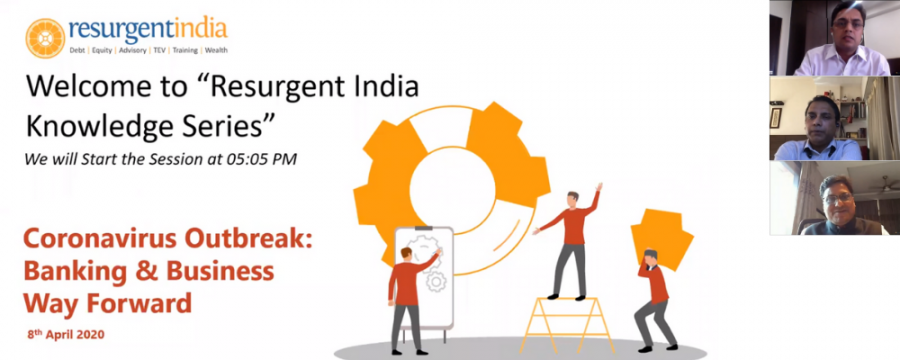RESURGENT INDIA KNOWLEDGE SERIES PRESENTS
Webinar on "Coronavirus Outbreak Banking & Business Way Forward"
Speakers: Mr DK Agarwal, President-PHDCCI
Speakers: Mr Sidarth Rath, MD-State Bank of Mauritius
Moderated By: Mr Jyoti Prakash Gadia, MD-Resurgent India Limited
Key Takeaways
⇒ During this period of lockdown business operations have been affected gravely. The lockdown may get lifted partially and in a staggered manner. Challenges faced by the businesses will be mismatch of cashflow, labor movement issues, payment of salaries and wages, utility bills, etc will add on to the burden of cashflow management. Disruption of demand and supply.
⇒ Finance and liquidity issues will be the primary problem issued by majority of the businesses. Moratorium of various loans should be extended to 6 months instead of 3 months including interest on term loan and working capital. Banks should also treat non-fund-based limits as term loan for temporary period and moratorium should be implemented on it.
⇒ 10% automatic enhancement of the existing working capital limit should be increased to 25% without any separate application. Loan accounts classified as SMA 1 and 2 before 1st march 2020 should be treated as standard accounts and similarly should be extended moratorium to pay off the liabilities
⇒ Indian industries including micro and small enterprises will be back on its feet in a year’s time. There will disruption in demand in short term but not in long term.
⇒ Banks will play a key role in the re-developing economy. RBI has infused liquidity to the banks under the ‘TLTRO’ scheme and directed banks to use that funds to subscribe to bonds of various NBFCs which will give NBFCs some relief. RBI is still yet to make a decision if NBFC will also be part of the forbearance of payment for 3 months.
⇒ It's in the interest of the bank to see that their exposure to the NBFC sector is not impacted or come under any stress. Banks are not averse to sanctioning loans to NBFC if the proposal is met with the stipulated parameters.
⇒ RBI is yet to provide clarification on the treatment of non-fund-based limits. The banks will have to take an individual stand for time being within their scope.
⇒ There are borrowers who have come forth and paid their dues because they have the ability and resources to pay. There are some that even though they have the ability to pay are opting out of it to conserve cash.
⇒ The lines between the good borrower and the bad borrower have been blurred due to an extraordinary situation, so it’s not ethical to judge anyone based on events of the current situation. Although, banks will have to take calls and distinguish borrowers based on their contingency plans if this scenario pulls out for a long time.
⇒ Respective Regulators should make sure that banks are well-capitalized and should have liquidity at their disposal. Industries across must not take any undue advantage of the situation and corporates with sound financial ability should avoid using the moratorium.
⇒ RBI broad objective at this time is to make industries and businesses competitive by making the available low cost of funds
⇒ The forecasted increase in the level of NPA demands the bank to maintain capital, which can be a challenge for the short term. However, India has immense scope of development and opportunity and will bounce back tentatively in 6 months to a year’s time.
⇒ Pricing has been a function of the rating of the borrower and he subsequently gets the advantage of the lower cost of funds from the loan market or availing any other market instruments.

⇒ Tourism and hospitality are stricken in the worst manner not in India but globally and they have to be considered across on a relative basis
⇒ This is the time for industries and sectors including banking to reflect on the measures to be pursued in order to get business up and running and back on its feet.
⇒ Banks and institutions will have to watch how individual entities have prepared themselves in this interim period in terms of operational efficiency and other measures.
⇒ As a banker, if a bank guarantee is invoked, the bank has to honor the commitment.
⇒ RBI has left it to banks in terms of increasing the Drawing power period and recalculation of the working capital cycle subjected to the type of industry and class of borrower. The underlying intent of the regulators is to ensure that industries hit aggressively are not exponentially affected. If there are examples of industries where the cycle has stretched, the bank has the power to take a call based on the practical solution and mutual benefit.
⇒ Banks, financial institutions, agencies, and regulators across will have to sit down and reassess the entire situation once this threat has subsided and life gets to near normal to make informed decisions on the way forward.
⇒ One of the most crucial roles of the banks as an intermediary is to extend loans and funds, which banks are here for and will do. They will facilitate funds not only in the form of loans but also in investing through bonds, commercial papers, etc.
⇒ Technology is and will keep playing a significant role in connecting and reaching out to people extensively. Its importance has been proven more so at a time like this. Digital banking is host to a lot of key transactions and the utilization of technology is going to grow rapidly
⇒ Sectors that are imperial for the future economic growth of the country should do well in the long term for a nation to hoist bag to its a previous position or higher.
►Watch the webinar here: https://www.youtube.com/watch?v=Ih3SYMP566E&t=301s